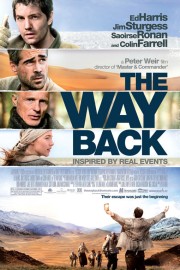The Way Back
There is something to be said for those filmmakers who exhibit patience in making films. I appreciate that filmmakers like Steven Spielberg, Ridley Scott, and Alfred Hitchcock have been able to (or were able to) crank out film after film with a certain regularity, but there’s also something to be said about those who have taken their time and whose films have displayed the passion that comes through with each project.
“The Way Back” is the latest film from Australian director Peter Weir, which is only his 13th in a career that dates back to the ’70s and his first since the thrilling 2003 adventure, “Master and Commander: The Far Side of the World.” His new film is inspired by the incredible true story laid out by Slavomir Rawicz in his book, The Long Walk: The True Story of a Trek to Freedom. In the book Rawicz speaks of when he and a group of prisoners escaped from a Siberian labor camp during WWII and traveled 4,000 miles on foot through Mongolia and the Gobi Desert before completing their journey in India. In the film the prisoners are led by Janusz (a superb Jim Sturgess, almost unrecognizable through most of the film), a Polish man who was imprisoned for being a spy after the Russian army tortured a confession out of his wife. It will be decades before they have a chance to be reunited.
Weir is one of the most intriguing filmmakers in modern cinema. His body of work includes not just “Master and Commander” but “The Truman Show,” “Fearless,” “The Year of Living Dangerously,” “Gallipoli,” “Witness,” and “Dead Poets Society.” That’s a pretty impressive list, no? “The Way Back” is another ambitious notch on his considerable filmmaking belt. With his long-time cinematographer, Russell Boyd, he creates extraordinary images of the terrain Janusz and the other escapees (including an American played by the exemplary Ed Harris, who calls himself Mr. Smith, and a Russian thug played by a live-wire Colin Farrell, who bullies his way into the group) must travel on their journey. Whether it’s the unforgiving cold of the Siberian forest, the deadly heat of the Gobi Desert– which takes the life of the young Polish girl (played by the lovely and lively Saoirse Ronan) they pick up along the way –or the rocky terrain of the Himalayas that the group (by this time down to four) must climb to get to India, Weir and Boyd deliver sights that are powerful and unforgettable, especially with the music of Burkhard Dallwitz (who also scored “The Truman Show”) accompanying such sights. Over the years Weir has proven himself a master of films with a grand scope that doesn’t dwarf the human story at the center.
Unfortunately, the human story is too thin to really match the 130-minute running time, regardless of the film’s visual beauty and solid performances. In that way Weir is not unlike other directors (think Stanley Kubrick, who made 13 in 46 years, and Andrei Tarkovsky, who made 7 in 24) who have taken their time in making their films: not every film may be a masterpiece, but each film resonates with the passion and intelligence of the person who made it.










